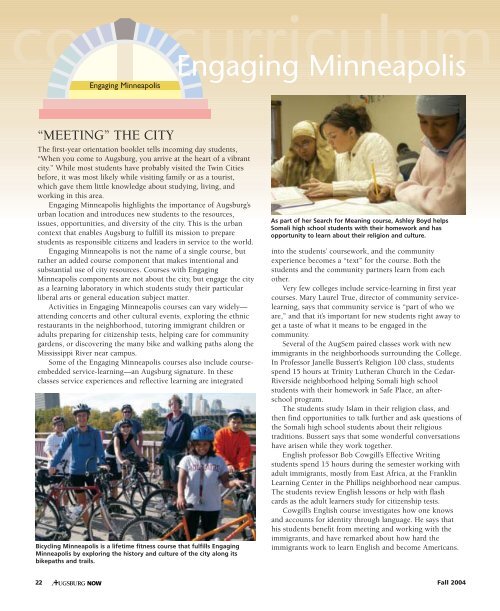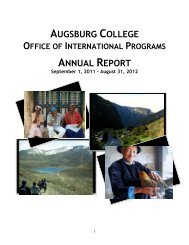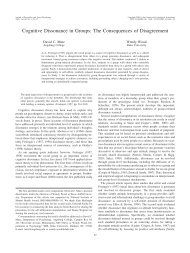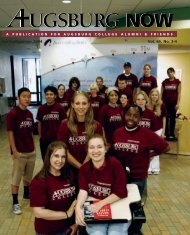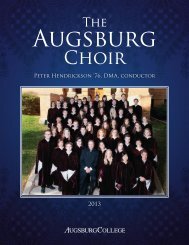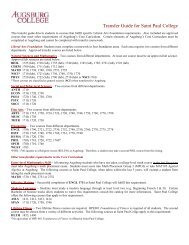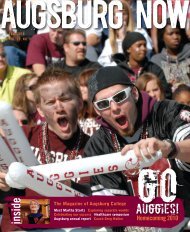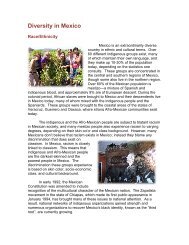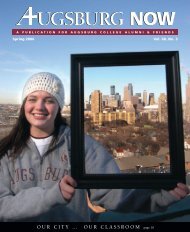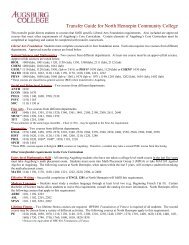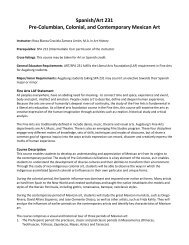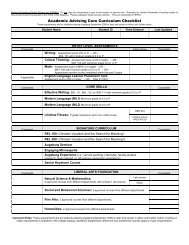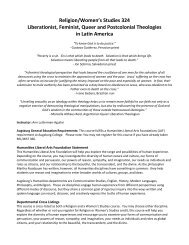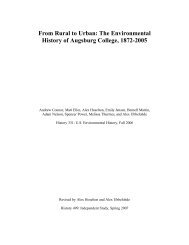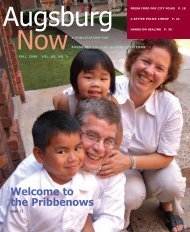core curriculumEngaging Minneapolis“MEETING” THE CITYThe first-year orientation booklet tells incoming day students,“When you come to <strong>Augsburg</strong>, you arrive at <strong>the</strong> heart of a vibrantcity.” While most students have probably visited <strong>the</strong> Twin Citiesbefore, it was most likely while visiting family or as a tourist,which gave <strong>the</strong>m little knowledge about studying, living, andworking in this area.Engaging Minneapolis highlights <strong>the</strong> importance of <strong>Augsburg</strong>’surban location and introduces new students to <strong>the</strong> resources,issues, opportunities, and diversity of <strong>the</strong> city. This is <strong>the</strong> urbancontext that enables <strong>Augsburg</strong> to fulfill its mission to preparestudents as responsible citizens and leaders in service to <strong>the</strong> world.Engaging Minneapolis is not <strong>the</strong> name of a single course, butra<strong>the</strong>r an added course component that makes intentional andsubstantial use of city resources. Courses with EngagingMinneapolis components are not about <strong>the</strong> city, but engage <strong>the</strong> cityas a learning laboratory in which students study <strong>the</strong>ir particularliberal arts or general education subject matter.Activities in Engaging Minneapolis courses can vary widely—attending concerts and o<strong>the</strong>r cultural events, exploring <strong>the</strong> ethnicrestaurants in <strong>the</strong> neighborhood, tutoring immigrant children oradults preparing for citizenship tests, helping care for communitygardens, or discovering <strong>the</strong> many bike and walking paths along <strong>the</strong>Mississippi River near campus.Some of <strong>the</strong> Engaging Minneapolis courses also include courseembeddedservice-learning—an <strong>Augsburg</strong> signature. In <strong>the</strong>seclasses service experiences and reflective learning are integratedBicycling Minneapolis is a lifetime fitness course that fulfills EngagingMinneapolis by exploring <strong>the</strong> history and culture of <strong>the</strong> city along itsbikepaths and trails.As part of her Search for Meaning course, Ashley Boyd helpsSomali high school students with <strong>the</strong>ir homework and hasopportunity to learn about <strong>the</strong>ir religion and culture.into <strong>the</strong> students’ coursework, and <strong>the</strong> communityexperience becomes a “text” for <strong>the</strong> course. Both <strong>the</strong>students and <strong>the</strong> community partners learn from eacho<strong>the</strong>r.Very few colleges include service-learning in first yearcourses. Mary Laurel True, director of community servicelearning,says that community service is “part of who weare,” and that it’s important for new students right away toget a taste of what it means to be engaged in <strong>the</strong>community.Several of <strong>the</strong> AugSem paired classes work with newimmigrants in <strong>the</strong> neighborhoods surrounding <strong>the</strong> <strong>College</strong>.In Professor Janelle Bussert’s Religion 100 class, studentsspend 15 hours at Trinity Lu<strong>the</strong>ran Church in <strong>the</strong> Cedar-Riverside neighborhood helping Somali high schoolstudents with <strong>the</strong>ir homework in Safe Place, an afterschoolprogram.The students study Islam in <strong>the</strong>ir religion class, and<strong>the</strong>n find opportunities to talk fur<strong>the</strong>r and ask questions of<strong>the</strong> Somali high school students about <strong>the</strong>ir religioustraditions. Bussert says that some wonderful conversationshave arisen while <strong>the</strong>y work toge<strong>the</strong>r.English professor Bob Cowgill’s Effective Writingstudents spend 15 hours during <strong>the</strong> semester working withadult immigrants, mostly from East Africa, at <strong>the</strong> FranklinLearning Center in <strong>the</strong> Phillips neighborhood near campus.The students review English lessons or help with flashcards as <strong>the</strong> adult learners study for citizenship tests.Cowgill’s English course investigates how one knowsand accounts for identity through language. He says thathis students benefit from meeting and working with <strong>the</strong>immigrants, and have remarked about how hard <strong>the</strong>immigrants work to learn English and become Americans.22 <strong>Fall</strong> <strong>2004</strong>
core curriculumA LESSON IN COMPUTERS AND CULTUREBusiness/MIS professor Lee Clarketeaches a first-year course, MIS 175Principles of Computing for Business.It’s an introductory course formanagement information systems (MIS)students to learn Microsoft Officeprograms and how <strong>the</strong>y are used inbusiness to reach goals and solvebusiness problems.The course is designed to include anEngaging Minneapolis component. Thatpart of <strong>the</strong> course, which Clarke calls<strong>the</strong> experience “text,” involves apartnership with <strong>the</strong> Cedar-RiversidePlaza Residents Resource Center. There,<strong>Augsburg</strong> students work 15 hours persemester as assistants in <strong>the</strong> computerclass or open lab. The residents aremostly Somali refugees; many havelimited English skills and some have nevertouched a computer.Clarke requires three assignments thatconnect <strong>the</strong> subject matter with <strong>the</strong>service experience. In one, students reflecton <strong>the</strong> digital divide with its issues oftechnology “haves” and “have-nots” andtalk about how <strong>the</strong> Resource Center helps<strong>the</strong> residents overcome <strong>the</strong>se barriers. Thelast assignment asks <strong>the</strong> students to reflectpersonally—what <strong>the</strong>y learned at <strong>the</strong>center and how it relates to <strong>the</strong>ir course.Freshman business student Jerrad Honstad helps a Somali womanat Riverside Plaza learn computer skills.One student wrote, “This experiencehelped me to meet [new immigrants], andI can look at <strong>the</strong> world and America in awhole new light. … I feel that you canlearn more in <strong>the</strong> short 15 hours I worked<strong>the</strong>re than you can in some classes you goto daily for a whole semester.”Ano<strong>the</strong>r student talked about anunforgettable moment after helping anolder man learn to use Microsoft Word.“Then one day he came in quite as usualbut with a huge smile on his face,” <strong>the</strong>student wrote. “He handed mea piece of paper that said,‘Thanks for helping me.’ Itwas typed in real big, boldletters. He <strong>the</strong>n looked at meand said, ‘Look, I learned howto use Word.’ ”A disabled studentthought he would not be ableto help, but later wrote,“Little did I know that I wasabout to prove myself wrong,very wrong.” The computerinstructor told him that sincehe was not able to actually do<strong>the</strong> computing for <strong>the</strong>residents, it was morebeneficial for <strong>the</strong>m, since<strong>the</strong>y had to listen to <strong>the</strong> student’sexplanation and do <strong>the</strong> work <strong>the</strong>mselves.For <strong>the</strong> young business students inhis class who have always had computersin <strong>the</strong>ir lives, Clarke knows <strong>the</strong>y are nowmore aware of <strong>the</strong> disparities of wealthand technology in <strong>the</strong> world. Theexperience of working with newimmigrants, many of <strong>the</strong>m close to <strong>the</strong>students’ grandparents’ ages, also gave<strong>the</strong>m a greater appreciation of cultureand citizenship.KeystonePUTTING ITTOGETHERIf Engaging Minneapolis is <strong>the</strong> bookendon <strong>the</strong> front end of an <strong>Augsburg</strong>education, <strong>the</strong> keystone experience is<strong>the</strong> final bookend. During <strong>the</strong> years inbetween, students delve into a major,build professional as well as life skills,apply <strong>the</strong>ir classroom learning, explorefaith, and experience <strong>the</strong> city. Thekeystone course usually occurs in <strong>the</strong>senior year, close to graduation.The keystone in <strong>the</strong> <strong>Augsburg</strong> Core,as in architecture, provides <strong>the</strong> shapeand support to <strong>the</strong> structural elementsof <strong>the</strong> arch. It connects <strong>the</strong> broad liberalarts foundation with <strong>the</strong> professionalskills and <strong>the</strong> in-depth study in <strong>the</strong>major. It helps students begin <strong>the</strong>transition to <strong>the</strong>ir after-college life.Learning goals include a revisiting of<strong>the</strong> critical conversations about vocationthat were begun in <strong>the</strong> first Search forMeaning course. Attention is paid toreflection on vocation, leadership, andservice in a diverse world.The value of <strong>the</strong> keystone, says MISprofessor Nora Braun, who piloted anMIS keystone course, is that it’s timefocused on thinking about all <strong>the</strong> piecesin an <strong>Augsburg</strong> education and what <strong>the</strong>student has done with <strong>the</strong>m. “It’s areflection and a pulling toge<strong>the</strong>r of <strong>the</strong>total experience in and out of <strong>the</strong>classroom.” Braun asks her students towrite an “education autobiography” thatreflects on <strong>the</strong> identified outcomes of<strong>the</strong>ir <strong>Augsburg</strong> education.<strong>Fall</strong> <strong>2004</strong>23


